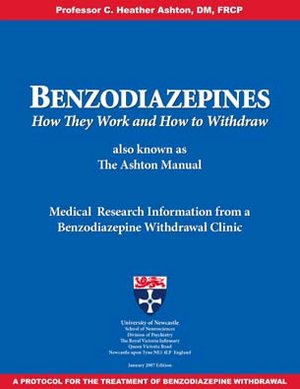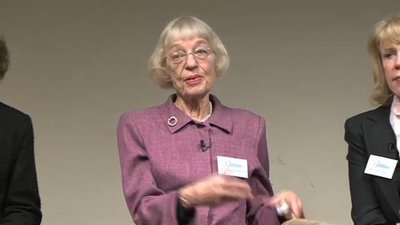Prof. Ashton / The Ashton Manual

IMPORTANT
The withdrawal schedules provided in the manual are only intended as "general guides". Each person's experience of withdrawal is unique and the course of withdrawal depends on many factors.
- See important message from Prof. Ashton
- See background
- Consult your doctor and pharmacist
- Consider the following cautionary points
Some genetic differences occur in Asian populations. Due to this, it has been said that some individuals have found it difficult switching to diazepam as recommended. The important thing is to accommodate individual factors.
Contains expert advice on benzodiazepines and how to withdrawal written by world renowned expert Prof. Heather Ashton.
Please note that no donation is requred as suggested on the last page of the PDF.
Top of Page
Notice
Prof. Ashton has granted permission for an HTML version of The Ashton Manual to be hosted on this website in Japanese and English enabling easier access for both PC and cell phone users.

Chrystal Heather Ashton DM, FRCP is Emeritus Professor of Clinical Psycho-pharmacology at the University of Newcastle upon Tyne, England.
Professor Ashton is a graduate of the University of Oxford and obtained a First Class Honours Degree (BA) in Physiology in 1951. She qualified in Medicine (BM, BCh, MA) in 1954 and gained a postgraduate Doctor of Medicine (DM) in 1956. She qualified as MRCP (Member of the Royal College of Physicians, London) in 1958 and was elected FRCP (Fellow of the Royal College of Physicians, London) in 1975. She also became National Health Service Consultant in Clinical Psychopharmacology in 1975 and National Health Service Consultant in Psychiatry in 1994.
She has worked at the University of Newcastle upon Tyne as researcher (Lecturer, Senior Lecturer, Reader and Professor) and clinician since 1965, first in the Department of Pharmacology and latterly in the Department of Psychiatry. Her research has centred, and continues, on the effects of psychotropic drugs (nicotine, cannabis, benzodiazepines, antidepressants and others) on the brain and behaviour in man. Her main clinical work was in running a benzodiazepine withdrawal clinic for 12 years from 1982-1994.
She is at present involved with the North East Council for Addictions (NECA) of which she is former Vice-Chairman of the Executive Committee on which she still serves. She continues to give advice on benzodiazepine problems to counsellors and is patron of the Bristol & District Tranquilliser Project. She was generic expert in the UK benzodiazepine litigation in the 1980s and has been involved with the UK organisation Victims of Tranquillisers (VOT). She has submitted evidence about benzodiazepines to the House of Commons Health Select Committee.
She has published approximately 250 papers in professional journals, books and chapters in books on psychotropic drugs of which over 50 concern benzodiazepines. She has given evidence to various Government committees on tobacco smoking, cannabis and benzodiazepines and has given invited lectures on benzodiazepines in the UK, Australia, Sweden, Switzerland and other countries.
Professor Ashton may be contacted at:
Department of Psychiatry
Royal Victoria Infirmary
Newcastle upon Tyne
NE1 4LP
England UK
Top of Page

Professor C Heather Ashton
For more information on Prof. Ashton, her work, and benzodiazepines,
please visit: http://www.benzo.org.uk

Notice
As stated on the above website:
Please be advised that Professor Ashton is now fully retired and no longer based at Newcastle University. She is therefore unable to deal with personal email enquiries with regards to benzodiazepine-related problems.
WARNING
- Any information given on this site should not be substituted for the advice of a physician who is well-informed about benzodiazepine dependency and withdrawal.
- All information given here is therefore to be followed at your own risk (See Disclaimer).
- Abrupt cessation of benzodiazepines may be very dangerous. Always consult your prescriber if you are considering making any changes.

The primary language of this website is English. Japanese appears as translations only (except for some original court documents).
These translations have been done by many different translators including me. Therefore, there are differences in quality and styles.
Please understand that I am not native Japanese and subsequently there are parts that may sound unnatural in Japanese.
“If any drug over time is going to just rob you of your identity [leading to] long, long term disaster, it has to be benzodiazepines.”

Dr John Marsden,
Institute of Psychiatry, London
November 1, 2007
“Benzos are responsible for more pain, unhappiness and damage than anything else in our society.”

Phil Woolas MP,
Deputy Leader of the House of Commons,
Oldham Chronicle, February 12, 2004
“The benzodiazepines are probably the most addictive drugs ever created and the vast army of enthusiastic doctors who prescribed these drugs by the tonne have created the world's largest drug addiction problem.”

The Drugs Myth, 1992
“It is more difficult to withdraw people from benzodiazepines than it is from heroin.”

Professor Malcolm H Lader
Institute of Psychiatry London
BBC Radio 4, Face The Facts
March 16, 1999
“Clearly, the aim of all involved in this sorry affair is the provision of justice for the victims of tranquillisers.”

THE WRITING IS
ON THE WALL
for benzodiazepine use

Dr Andrew Byrne
Redfern NSW Australia
Benzodiazepine Dependence, 1997







